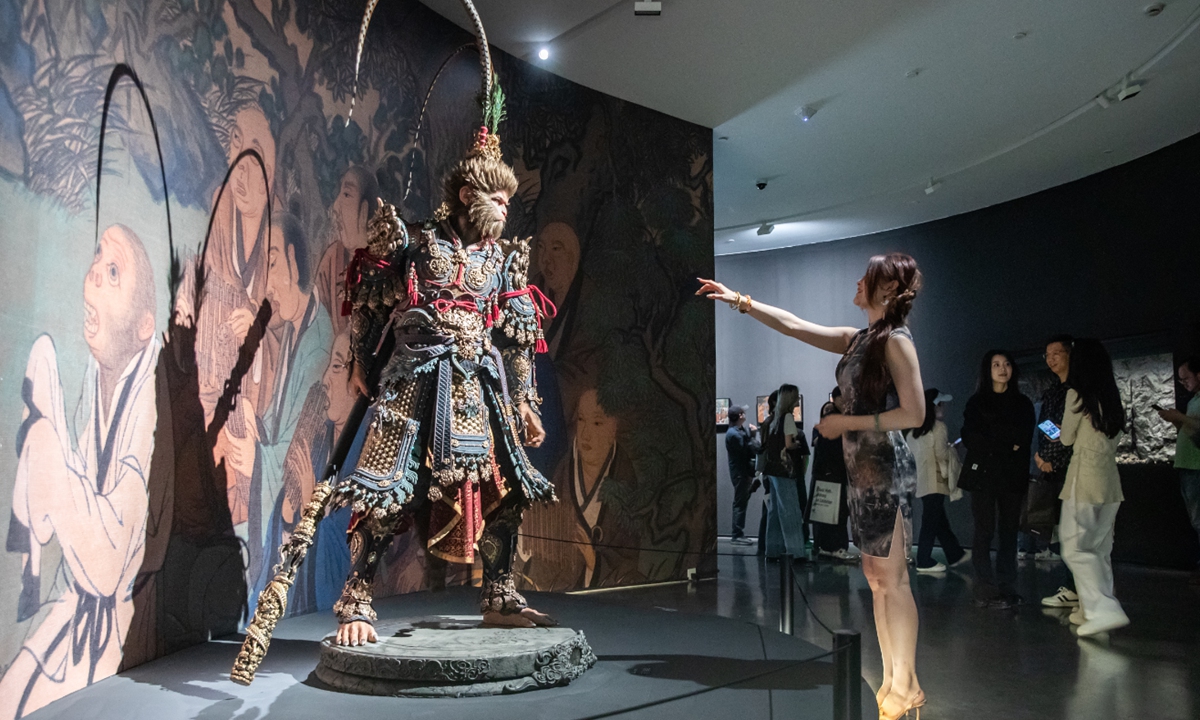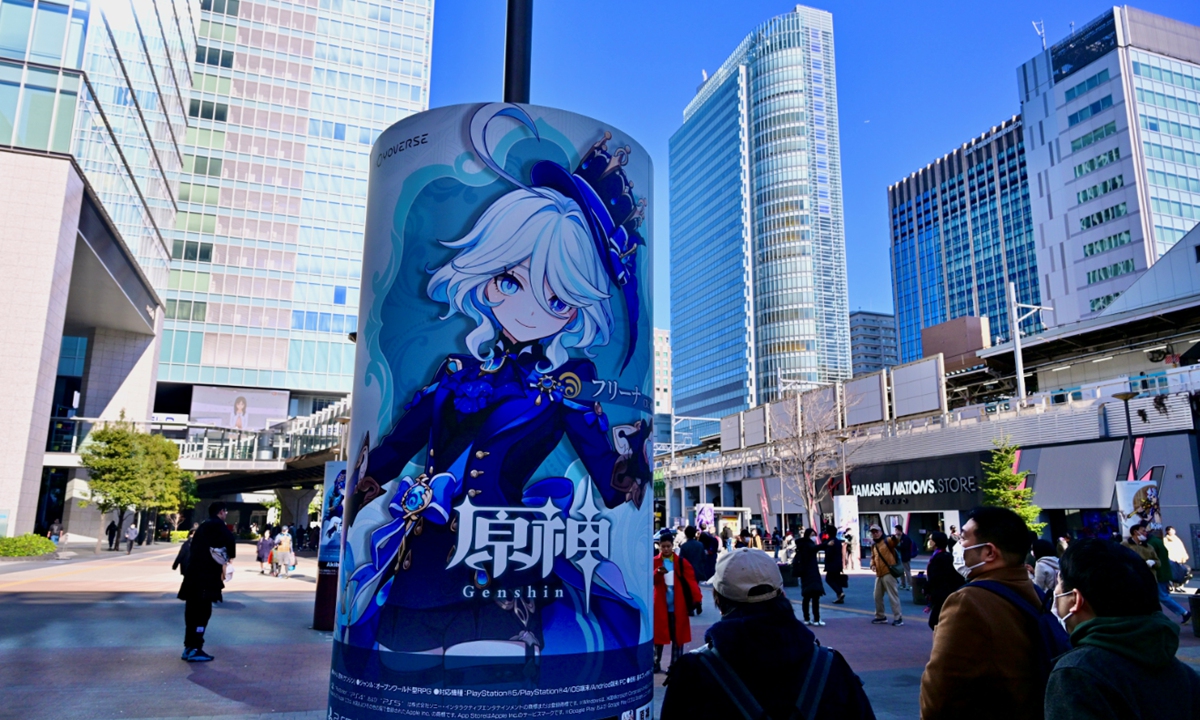
Visitors explore the Black Myth: Wukong Art Exhibition in Hangzhou, East China's Zhejiang Province. Photo: VCG
Editor's Note
In recent years, a new wave of Chinese cultural products, represented by games, short dramas, and online literature, has captivated millions overseas.
Data underscores this rise. In 2024, Chinese independently developed games generated $18.56 billion in overseas sales, Chinese micro-short drama companies have launched over 300 apps overseas, amassing more than 470 million downloads across over 200 countries and regions, while a top Chinese platform for online literature exports attracted nearly 300 million users from abroad.
More importantly, this global spread of culture has evolved from "one-way export" to "co-creation." In this "Cultural Voyages" series, the Global Times will talk to cultural consumers, creators, and practitioners from both China and abroad to see how Chinese cultural products are changing people's lives.
From player to traveler
In the hills of Southwest China's Chongqing Municipality, German vlogger Maik Gramalla paused before the ancient walls of the Dazu Rock Carvings, searching for real-life scenes that mirror the world of the Chinese produced game
Black Myth: Wukong and capturing them through the lens of his camera.
Inspired by the mythical worlds of many Chinese-produced games like
Moonlight Blade and
Genshin Impact, Gramalla travels across China, seeking the real-world echoes of ancient legends brought to life through digital storytelling.

German vlogger Maik Gramalla
As many of his videos quickly rack up hundreds of thousands of views, Gramalla has crossed a threshold, going from a gaming admirer to a real-world explorer, and now a storyteller, sharing these moments with the world.
Years ago, Gramalla's first encounter with Chinese games was purely visual, involving beautiful landscapes, stirring music, distant myths. But standing in front of the rock carvings, camera in hand, he realized he was no longer just a player or a traveler.
"I love these games not just because of their beautiful graphics and moving music, but because they showcase China's long history and profound culture," Gramalla told the Global Times.
"Even without understanding Chinese, one can feel the flow of emotions," he said.
Gramalla has visited places like Jiuzhaigou and Huanglong in Southwest China's Sichuan Province, which he said are featured in action role-playing game
Genshin Impact.
"When I saw those landscapes with my own eyes, I was truly amazed," he said.
In Gramalla's eyes, Liyue Harbor in
Genshin Impact is not just a virtual city, but a microcosm of the geographical features of southern China.
"Liyue reminds me of Guizhou Province that I visited," he said. "The character Hu Tao from the game brings the unique charm of the Qingming Festival to players around the world."
Standing before the thousand-year-old stone walls, the deities and myths carved into them transcend being mere images, coming to life to tell stories of deep, ancient history and the enduring continuity of faith.

People walk past a Genshin Impact poster in Tokyo, Japan. Photo: VCG
Re-reading a Chinese classicIn 2024, before the official release of the game
Black Myth: Wukong, a challenge post in the game's official Discord community caught people's attention: re-read the classic Chinese novel
Journey to the West and discuss with other players how this ancient classic is reborn in the game. This challenge received responses from players around the world, many of whom began reading the novel.
The challenge was initiated by Italian content creator Ahytys, who is not only a loyal player of
Black Myth: Wukong, but also one of the administrators of both the official and unofficial communities for the game.

Italian content creator Ahytys
Ahytys told the Global Times that the rise of the Chinese gaming industry in recent years has brought a much-needed "breath of fresh air" to the global gaming world.
"In the past, the Western gaming market was dominated by sequels, prequels, and reboots, and creativity gradually dwindled," he said. "China's high-budget original games are precisely breaking this deadlock."
In Ahyty's view,
Black Myth: Wukong is a symbol of this transformation. It has captivated countless overseas players with its strong cultural essence and visual intensity.
"This is not only a victory for China's game industry, but also a shared expectation for gamers around the world," Ahytys noted.
"I look forward to more Chinese games being translated and reaching the global stage - not just through language translation, but through cultural dissemination."
There is a common voice online that says understanding the cultural context of Chinese games still presents some challenges for many Western players.
"I don't think the developers can explain every cultural reference in detail," Ahytys admitted.
"But they have created an immersive experience through the story and atmosphere, which can captivate players even if they don't fully understand the background."
"Out of my interest in Chinese culture, I taught myself Chinese, read
Journey to the West, and made many Chinese friends in gaming communities," he added.
From 'playable' to 'creating new worlds'In the comments section of a YouTube video about an upcoming Chinese Wuxia (a genre of Chinese fiction focusing on martial arts and chivalry) game, one of the most-liked comments reads, "Finally, someone knows it's called Wuxia, not samurai." This comment reflects how Chinese games and their associated cultural elements are increasingly making their way onto the global stage.
A look back at China's gaming journey. In 2024, the actual sales revenue of Chinese self-developed games in overseas markets reached $18.56 billion, marking a 13.39 percent year-on-year growth. This figure has exceeded 100 billion yuan ($13.7 billion) for five consecutive years, setting a record.
In April, China's National Press and Publication Administration updated its approval information for imported online games, with nine new games granted approval. Additionally, the agency also published the approval details for domestic online games, with 118 games receiving approval.

Gaming industry observer Liu Mengfei
"Today's Chinese game industry is not only capable of competing with global peers in terms of technology, but also shows a breakthrough in originality and cultural expression," Liu Mengfei, a gaming industry observer at Beijing Normal University, told the Global Times.
Liu pointed out that while technology serves as the foundation, culture is the soul. Chinese games are gradually moving away from the old stereotypes of being "imitative" and "low-cost" and are transitioning into a new role as "cultural exporters."
"More and more works are no longer content with offering just a 'playable' experience; they are dedicated to creating worlds that 'have something to say,'" Liu noted.
"This trend is reshaping global players' perception of China."
Liu said that this "game + culture" model is a unique path through which China's game industry has risen. She emphasized, however, that the industry must strike a balance between success and cultural integrity.
"We must be cautious about a phenomenon in which many domestically successful games with high overseas revenue still rely on 'Westernized business models,' particularly designs that heavily focus on microtransactions while neglecting cultural expression," she cautioned.
To totally transition from "market success" to "cultural influence," the Chinese game industry may need a new transformation in the future. Liu and her team propose that this transformation should begin with policy, mechanisms, and collaboration.
"If Chinese games can build cultural confidence on the foundation of technical excellence, they have the potential to become a new medium for global cultural dissemination. The truly important games in the future won't just be 'fun to play,' but 'have something to say,'" she noted.
One esports competition at a time
As video games continue to evolve, one of the most prominent developments has been the rise of esports, a competitive form of gaming that goes beyond casual play. Esports is a competitive form of video gaming that relies on game rules for confrontation, and it has developed into a mature event system and culture.
The inaugural Olympic Esports Games will be held in 2027 in Riyadh, the capital of Saudi Arabia. This event is a milestone for both the esports and Olympic sports fields.
"Is esports mainstream? The answer is already clear. It's not just entertainment; it's a mainstream sport capable of uniting young people across the globe," Wang Xinyi (Jonny), VSPO's co-founder and the chief executive of the Esports Asian Champions League (ACL), told the Global Times.

ACL Chief Executive Wang Xinyi
In recent years, esports viewership and fan communities have grown to rival traditional sports worldwide.
"Unlike sports like football or basketball, which require a consensus on language and rules, esports delivers emotions and intensity in an "instant" manner - no translation is needed. All that's required is to fight side by side, and you can immediately feel the thrill of victory, defeat, and teamwork," Jonny said.
China's thousands of years of history have provided endless inspiration not just for Chinese, but for global game development, and these elements are gradually entering the global gaming community's awareness.
"This is a way for Chinese culture to 'soft land' in overseas communities - not through preaching, but through entertainment and experience, subtly influencing and touching people's hearts," he said.
Successful cultural exports take time and effort. Despite esports having stepped onto the mainstream stage, its commercial value and industrial ecosystem are still being refined. Jonny admitted that, compared to established leagues like the NBA, esports is still in the "exploring rules and order" phase.
"In this cultural evolution, driven by competition, esports may be playing a less obvious but increasingly important role - writing the cultural memory of this era in the most youthful way and bringing the voice of Asia to the global stage," he noted.
In this unfolding narrative, players and audiences worldwide are not merely consuming content, they are participating in a deeper cultural dialogue, one game, one story, and one competition at a time.









